Balkan countries

Lucija Grahek,Pezdirčeva njiva v Podzemlju. Železna doba od Podzemlja do Vinice / Pezdirčeva njiva in Podzemelj. Iron Age from Podzemelj to Vinica.(Opera Instituti Archaeologici Sloveniae 50)Ljubljana 2025ISBN 978-961-05-1072-7 456 S./pp., zahlr. Farb- und S/W-Abb. / num. colour and b/w-figs., 29,7 x 21 cm; kartoniert/hardcoverPodzemelj in Bela Krajina region have long been recognised as one of the key and best-researched Iron Age centres of the Dolenjska Hallstatt culture. The recently excavated large cemetery at Pezdirčeva njiva, situated on the north-western slope beneath the hillfort on Kučar, opens a new chapter in the study of this centre and the wider Dolenjska region. Burials at the site begin only in the 5th century BCE and continue uninterrupted until the early 1st century BCE. This monograph provides the first comprehensive publication of modern excavations of graves belonging to the Vinica cultural sphere, which until now had not been systematically analysed. The volume brings together the results of several years of fieldwork directed by Otmar Kovač and the author, and presents detailed documentation of more than 180 graves with rich assemblages of grave goods. The finds are illustrated on 85 plates, and a large-scale plan of the central part of the cemetery is included as an appendix. Analyses of funerary practices, costume, weaponry, pottery, and jewellery are complemented by a wide array of scientific studies assembled in Chapter 10. The monograph incorporates the results of pedological and geoarchaeological research (A. Prijatelj, H. Grčman, R. Turniški) and conservation–archaeometallurgical examinations of non-ceramic finds (N. Nemeček, M. Petrič, P. Fajfar, B. Šetina Batič, M. Nečemer). Additional contributions address textile remains (M. Gleba), archaeobotanical samples (T. Tolar), lithic finds (R. Brajkovič), and amber (M. Golec, Z. Golec Mírová, L. Kučera, J. Martínek). A particular strength of the monograph lies in its cultural and chronological synthesis, which situates Pezdirčeva njiva within the broader development of the Iron Age centre at Podzemelj and clarifies the structural and temporal differences between Late Hallstatt and Vinica-period graves. This comprehensive and interdisciplinary work significantly advances our understanding of settlement dynamics in Bela Krajina, from Podzemelj to Vinica, and provides new insights into cultural processes unfolding along the southeastern Alpine region during the Early and Late Iron Age.

Ivan Varbanov, Roman Coins and their prices realized. I. Roman Republican Coins. Volumes I & II vol. I: Chronology of the Roman Republican Coinage. Catalogue: Gold coinage. Silver coinage – Part Onevol. II: Catalogue: Silver coinage – Part Two. Bronze coinage. IndexesBurgas 2025vol. I: ISBN 978-619-93185-0-8vol. II: ISBN 978-619-93185-1-5vol. I: 808 S./pp., Illustrationen/figures; kartoniert / hardcovervol. II: 756 S./pp., Illustrationen/figures; kartoniert / hardcoverThere is much magic, beauty, and challenge in numismatics, but the Roman coinage remains my one and only undisputed favorite. For more than 50 years, I have been collecting valuable information and I can confidently say that I have gathered the largest database of Roman coins, with facts about millions of pieces, currently available in private collections or expositions and archives of museums, with essential details on tens of thousands of auctions, eBay sales, and many other sources. I was fortunate to have collected this database during a time when, thanks to the rapidly developing metal detecting methods and technologies, many coins and troves were found around the world, as if trying to fill the gaps in the great puzzle of Roman Republican, Imperatorial, and Imperial coinage, thus providing a more complete picture of Roman coins and mint craft. To begin with, I published a few books on Greek Imperial and Roman Provincial Coinage, such as the three volumes of “Greek Imperial Coinage”, covering the provincial coinage at the mints on the Balkan Peninsula, as well as the two volumes of “The Coinage of Philippopolis”, covering the complete mintcraft in this ancient city. However, the main part of my database consists of coins issued at the central Roman mints. As the process of identification and classification recently became almost unmanageable due to the vast number of Roman coins discovered so far, I decided to publish the already available information in catalogs, initially focusing on the Roman Republican coinage. This work aims to examine the Roman Republican coinage, covering the period from the irregularly shaped pieces of bronze known as Aes Rude (a.k.a. Aes Infectum or Imperfectum) to the period 8th – 3rd century BC and the beginning of Roman Imperatorial coinage (it will be considered in a separate volume), roughly around 49 BC. The purpose of this catalogue does not lie in providing a complete analysis of all aspects of the Republican coinage. In his work “Roman Republican coinage”, Michael H. Crawford dwells in detail on this topic and needs not be repeated. The current book simply aims to summarize the data already presented by the prominent scholars М. Crawford, А. Banti, L. Simonetti, E. Sydenham, E. Babelon, and all those who have contributed to the study and systematization of the Roman Republican coinage. The book also supplements the existing research by presenting many new coins that lack any previous description, together with their unpublished variants. It also covers a good number of hitherto unknown inscriptions, control marks, symbols, letters, or digits discovered after the publication of the fundamental works by the authors mentioned above. Apart from the main coin types, the classification presented herein describes all available varieties, including those absent in Crawford’s research, each marked with a separate number. All hybrid Republican coins for which I have found sufficient information are analyzed as well. A complete description of the coins issued by the mints during The Social War – the so-called denarii of the Marsic Confederation – is also added in this catalog. A fundamental principle I try to follow in my work is to compose each book in a manner that I would personally expect to see for any such data arranged in a catalog. My presentation also follows the requirements and recommendations gathered through discussions with colleagues and collectors from all over the world. Hence, the key principle of this catalog is to facilitate quick identification of any already acquired coins or, alternatively, provide complete data on items one might wish to acquire. Therefore, all the presented coins are arranged based on the metal they are made of, i.e., in the following sequence: gold, silver, bronze. Coins made of the same metal are further classified by their years of issue, as well as by their denominations. The design of a coin type is displayed in a photo adjacent to its description. Photos are provided on a 1:1 scale, apart from a few exceptions, where the scale is stated at the base. The year of issue is followed by the average value based on the weight of all coins of a specific variety. Since weight may vary within a wider range for some of the bronze items presented, the minimum, average, and maximum weight of the specimen is also provided. After a detailed description of the obverse and reverse for a given coin, all references for the same are duly listed, followed by the number of specimens used. Below each description, you will also find information about the specific prices at which the coin was sold, depending on its quality. Different prices are given for the different quality types: F (fine), VF (very fine), EF (extra fine), and MS (mint state). Furthermore, each quality type is featured with the minimum, average, and maximum price (min/avg/max) at which the coin was previously sold. All prices are in euros or have been converted to euros based on the exchange rate on the date the coin was sold, if it was originally sold in another currency. A detailed Appendix is enclosed at the end of this catalog, specifying all inscriptions, control marks, digits, or symbols visible on any Republican coins. After each of these marks, you will find listed the pages where the same symbol appears. For faster and easier identification, the Crawford numbering is included in the beginning of the Appendix, along with the corresponding numbering as per this catalog.

Gašper Oitzl,Svet Kovine / The World of Metal.Katalog stalne razstave kovine v Narodnem muzeju Slovenije / Catalogue of the Permanent Exhibition of Metalwork Collection in the National Museum of SloveniaLjubljana 2025ISBN 978-961-6981-85-9194 S./pp., zahlr. Farb- und S/W-Abb. / num. colour and b/w-figs., 23,5 x 17 cm; broschiert / softcover UVOD / INTRODUCTIONŽELEZO / IRONOd rude do izdelka / From Ore to ProductŽebljarstvo / Nail Making TradeEna prvih pridobitev Kranjskega deželnega muzeja / One of the First Acquisitions of the Provincial Museum of CarniolaKljuči in ključavnice / Keys and LocksNotranjeavstrijske industrijsko-obrtne razstave / Inner Austrian Industry and Craft Trade ShowsLito železo in železolivarna na Dvoru pri Žužemberku / Cast Iron and the Iron Foundry in Dvor near ŽužemberkKonservatorsko-restavratorska obdelava železnega gradiva / Conservation and Restoration of Iron Objects (Nataša Nemeček)KOSITER / TINIzdelava in uporaba kositrnih predmetov / Manufacture and Use of Pewter ObjectsZgodovina pridobivanja in uporabe kositra / History of the Manufacture and Use of TinKositrarska obrt na Slovenskem / The Pewter Craft in the Slovenian TerritoryKositrni predmeti v Narodnem muzeju Slovenije / Pewter Objects in the National Museum of SloveniaProvenienca zbirke v Narodnem muzeju Slovenije / The Provenance of the Pewter Collection at the National Museum of SloveniaZlitina britanija / Britannia Metal (Nataša Nemeček, Gašper Oitzl)Konserviranje in restavriranje kositrnih predmetov / Conservation and Restoration of Pewter Objects (Nataša Nemeček)BAKROVE ZLITINE / COPPER ALLOYSMehanske značilnosti bakrovih zlitin / Mechanical Characteristics of Copper AlloysMedenina / BrassZgodovina metalurgije barvnih kovin na Slovenskem / History of Non-ferrous Metallurgy in the Slovenian TerritoryZvonarna in livarna družine Samassa v Ljubljani / Samassa Family Foundry in LjubljanaPozlačene čaše iz cementiranega bakra / Gilded Cement Copper "Magic Cups"Cerkveni zvonovi / Church Bells (Darko Knez)Restavriranje bakrovih zlitin / Conservation and Restoration of Objects from Copper Alloys (Nataša Nemeček)Merila / Measures (Tomaž Lazar)Prototipi terezijanskih mer / Prototypes of Teresian Measures (Tomaž Lazar)Pečati in pečatniki v Narodnem muzeju Slovenije / Seals and Seal Dies in the National Museum of Slovenia (Jernej Kotar)SREBRO / SILVERZgodovina pridobivanja in uporabe plemenitih kovin / History of Extraction and Use of Precious MetalsNovo srebro / New SilverProizvodnja zlitin novega srebra / Production of New Silver AlloysSrebrni in posrebreni predmeti v Narodnem muzeju Slovenije / Silver and Silver-plated Objects in the National Museum of SloveniaČaša z novci / Beaker with CoinsKovinske tobačnice in cigaretnice / Metal Tobacco Boxes and Cigarette Cases (Darko Knez)Cerkveno posodje / Ecclesiastical Vessels (Darko Knez)Žara brata Gabriela Girauda / The Urn of Brother Gabriel Giraud (Darko Knez)Srebro, prevleke iz srebra in pozlačeno srebro / Silver, Silver-plate and Gilt Silver (Nataša Nemeček)IZBOR LITERATURE / SELECTION OF LITERATURESEZNAM RAZSTAVLJENIH PREDMETOV / LIST OF EXHIBITED OBJECTS

Boglárka Weisz – István Kádas – Judit Gál (eds.),Markets, Mints, and Merchants. Royal Economic Policy and Towns in Medieval HungaryBudapest 2025ISBN 978-963-416-513-2440 S./pp.; zahlr. Farb- und S/W-Abb./num. colour and b/w-figs., 29,7 x 21 cm; kartoniert/hardcover

Tatjana Tkalčec – Tajana Sekelj Ivančan – Juraj Belaj – Siniša Krznar (eds.),Ceramics, People and Places.The significance of ceramics for the study of social relations in the Middle AgesProceedings of the 9th International Conference on Mediaeval Archaeology of the Institute of Archaeology (Zagreb, 6th –7 th June 2024)(Zbornik Instituta za Arheologiju / Serta Instituti Archaeologici 23)Zagreb 2025ISBN 978-953-6064-83-0 510 S./pp., zahlr. Farb- und S/W-Abb./num. colour and b/w-figs., 29 x 21 cm; broschiert/softcover

Franco Nicolis – Gabriella Kulcsár – Volker Heyd (eds.),The Transformation of Europe in the Third Millennium BC, Part 1. Proceedings of the International Conference in Riva del Garda, Italy, 25-28 October 2023(The Yamnaya Impact on Prehistoric Europe 7)Budapest 2025ISBN 978-615-5766-84-8616 S./pp., zahlr. Farb- und S/W-Abb. / num. colour and b/w-figs., 28 x 20 cm; kartoniert/hardcoverThe Transformation of Europe in the Third Millennium BC, Part 1 presents the Proceedings of the second Riva del Garda conference on the Bell Beaker phenomenon (c. 2700–2000 BC), exploring one of the great turning points of European prehistory. With 32 contributions, grouped into six chapters, authored by 54 scholars from over 15 countries, the book brings together latest discoveries and exciting research results from across Europe. It spans topics like the origins and spread of Bell Beakers, their social and ideological dimensions, regional identities, ritual and economic practices, mobility and migrations, and the far-reaching impact of ancient DNA. Being part 1 of a two-part international conference project, the book offers a fresh synthesis of how Beaker groups connected distant regions and so shaped the cultural landscapes of the western half of the European continent.

Yavor Boyadzhiev, Life in 5th Millennium BC (Based on information from the dead) / Животът през V хилядолетие пр. Хр. (по сведения на мъртвите)(Excavations and Research / Разкопки и проучвания, vol. 53)Sofia 2025ISBN 978-619-245-578-1632 S./pp., zahlr. Farb- und S/W-Abb./num. colour and b/w-figs., 28,5 x 20 cm; kartoniert/hardcoverBulgarisch mit ausführlicher englischer ZusammenfassungBulgarian with an extended summary in EnglishThe research focuses on Chalcolithic burials from the territory of present-day Bulgaria. It is based not only on publications but also on personal conversations between the author and the researchers, field documentation, and the annual archaeological reports of the Department of Prehistory of NAIM-BAS, as well as on personal observations on the sites of Durankulak, Varna I, Kosharna, Kamenovo, and Yunatzite (horizon B1). Table of contents Introduction I. Research base1. The conceptual framework2. Burial ritual in the cemeteries3. Human remains within the settlement area4. Chronology of the Chalcolithic cemeteries II. Possibilities for social reconstruction on the basis of cemetery analysis 1. Theoretical formulation of the problem2. Issues related to the reconstruction of Chalcolithic society on the territory of present-day Bulgaria based on cemetery data III. The population 1. Ehtnocultural situation and processes in the 5th Millennium BC2. The people3. The family IV. The society/community 1. General typical features and differences between the burial rituals in Chalcolithic archaeological cultures2. Information about the society/community structure3. The economic development of the communities in the Late Chalcolithic4. Social development5. Spiritual life V. The end of the Chalcolithic population VI. Life during the 5th Millennium BC: How well can we understand it?

Mario Ivanov, The Invasion of the Costoboci in Lower Moesia and Thrace in 170 AD / (Excavations and Research / Разкопки и проучвания, vol. 54)Sofia 2025ISBN 978-619-245-589-7160 S./pp., zahlr. Farb- und S/W-Abb./num. colour and b/w-figs., 28,5 x 20 cm; kartoniert/hardcoverEnglisch mit ausführlicher bulgarischer ZusammenfassungEnglish with an extended summary in Bulgarian Table of contents Introduction I. Historical background II. Scope and methodology of the study. Sources and historiography III. Archaeological evidence of the invasion of the Costoboci 1. Lower Moesia2. Upper Moesia (Northwestern Bulgaria)3. Thrace4. Macedonia (Southwestern Bulgaria)IV. Reconstruction of the directions of the invasion V. Consequences of the Costoboci invasion. The provincial policy of Marcus Aurelius Acknowledgements Bibliography Bulgarian summary

Eva Tonkova,Pottery with West Slope decoration from present-day Bulgaria (Dissertationes, volume 22) /Керамика с украса в стил West Slope от територията на България (Дисертации, Том 22)Sofia 2025ISBN 978-619-245-577-4408 S./pp., S/W-Abb./b/w-figs., Tafeln/plates, 29,7 x 21 cm; kartoniert/hardcoverbulgarisch mit ausführlicher Zusammenfassung in englischbulgarian with extended summary in english The study is dedicated to a specific ceramic category from the Hellenistic Period, which was widely distributed throughout the Eastern Mediterranean and became one of the criteria for evaluating the scale and the extent of the “Hellenization” of vast cultural spaces and ethnic communities, from the western reaches of Ancient Greece to the Levant and the Middle East. The content of this book focuses on the pottery with West Slope decoration discovered within the territory of present-day Bulgaria and dated in the last quarter of 4th – the late 1st c. BC – a collection of artifacts from diverse archaeological contexts (settlements, burials, sanctuaries), but also from different cultural and geographic regions, such as the Greek cities in the Pontic region or the interior of Ancient Thrace. Chapter 1 discusses the decoration styles that occur within the collection from Bulgaria (Attic/imitational Attic style, Early Anatolian style, Late Anatolian style, the style of the Macedonian workshops). They represent different periods of the development of the West Slope ware and show different distribution patterns. For number of vases a regional Black Sea provenance is suggested and some of them could be identified as local products. The second chapter is dedicated to the Formal and Typological analysis of the finds. It discusses the shapes attested within present-day Bulgaria, arranged according to their function and chronology – from various types of kantharoi and other drinking vessels to askoi and unguentaria. Chapter ІІІ is dedicated to the analysis of the distribution of the ceramic category under consideration in Bulgaria. In the beginning, a short overview of the contexts of the finds is provided, and at the end of the part, there are some summarizing observations. The conclusion summarizes the results that the West Slope ceramics initially followed Classical traditions, especially in kantharoi, amphorae, and kraters for wine consumption, while local modifications persisted alongside new Hellenistic forms. The repertoire evolved under Athenian, Anatolian, and Macedonian influences, creating a largely uniform Pontic style that combined imported trends with local innovations. Distribution patterns reveal two cultural spheres: coastal settlements with a full tableware set, and the Thracian interior, where consumption was largely limited to cups. History of research I. West Slope pottery from Bulgaria: Decoration, ornamental motifs 1. Regional styles2. Finds from Bulgaria3. Attic/imitational Attic style4. Early Anatolian style5. Late Anatolian style6. The sytle of the Macedonian workshops7. Local productionII. West Slope pottery from Bulgaria: Formal and typological study 1. Early Classical kantharoi2. Cup-kantharos3. Pontic kantharoi Type I4. Macedonian kantharoi5. Kantharoi with hybrid characteristics6. Kantharos, strap handles, turned foot7. Calyx-cup8. Bowl-kantharos9. Bolster-cup10. Hellenistic kantharos11. S-shaped kantharos12. Kantharoi with short neck13. Macedonian Hellenistic kantharos 14. Attic skyphos15. Corinthian skyphos16. Hellenistic skyphoi of Classical shape17. Hemispherical cups18. New-pattern cups19. Hemispherical cups with interior decoration20. Hemispherical cups with interior decoration and relief emblems21. Mastos22. Late Hellenistic cups23. Skyphos variant C24. Skyphoi S325. Skyphoi with a concave decorative panel26. Pontic cantharoi typ III.127. Amphora28. Pelike29. West Slope oinochoe30. Chous31. Small jug with funnel-shaped mouth32. Lagynos33. Krater34. Lug-handled krater35. Other kraters36. Short-neck krater37. Lekythos38. Guttus39. Unguentarium40. AskosIII. Context, provenance and distribution of the ceramic artefacts with West Slope decoration from Bulgaria Conclusion 1. Main producers, workshops and influences2. Shapes, repertoire, geographical distribution Bibliography Figures

Roman Czaja – Helmut Flachenecker – Katharina Kemmer – László Pósán (Hrsg.),Der Deutsche Orden in Europa und in der Region. Festschrift für Udo Arnold zum 85. GeburtstagDebrecen 2025ISBN 978-963-490-721-3543 S./pp.; zahlr. Farb- und S/W-Abb./num. colour and b/w-figs., 29,7 x 21 cm; kartoniert/hardcover

Alin Henţ,Rethinking the Late Iron Age Dacians. A Historiographical and Archaeological Perspective on Status IdentitiesCluj – Napoca 2025ISBN 978-606-020-997-3260 S./pp., zahlr. Farb- und S/W-Abb./num. colour and b/w-figs., 28 x 22 cm; kartoniert/hardcover

Julia Braungart,Studien zur frühkupferzeitlichen Foeni-Gruppe im südwestlichen Rumänien anhand der Gefäßkeramik aus Foeni-Cimitirul OrtodoxCluj – Napoca 2022ISBN 978-606-020-444-2626 S./pp., zahlr. Farb- und S/W-Abb./num colour and b/w-figs., 29,7 x 21 cm; kartoniert/hardcover

Salvator Žitko – Brigitta Mader,Med Benetkami in Dunajem [Zwischen Venedig und Wien]Kulturna dediščina kot predmet nacionalnega prestiža in istrske identiteteKoper – Capodistria 2025ISBN 978-961-6732-71-0252 S./pp., zahlr. Farb- und S/W-Abb./num colour and b/w-figs., 29,7 x 21 cm; kartoniert/hardcover slowenisch (S. 1 - 176) und deutsch (S. 177 - 234) Das Buch „Zwischen Venedig und Wien“ von Salvator Žitek und Brigitte Mader enthüllt eine lange verborgene Geschichte über das Schicksal des kulturellen Erbes Istriens und der Küste während der Evakuierungen in Kriegszeiten und der politischen Umsiedlungen nach dem Krieg und wirft wichtige Fragen zum Denkmalschutz und zur gemeinsamen Verantwortung im heutigen Europa auf. In der Studie „Zwischen Venedig und Wien“, die das Ergebnis ihrer langjährigen Forschung auf dem Gebiet des Kulturerbeschutzes im Gebiet der ehemaligen österreichischen Küste, später der Julischen Alpen und heute insbesondere Istriens mit seinem nahen Hinterland ist, befassen sich die Autoren mit Fragen im Zusammenhang mit der Haltung der jeweiligen Regierungsstrukturen gegenüber beweglichem Kulturgut, aber auch mit den Massenevakuierungen zwischen 1940 und 1944 von wertvollen Kunstwerken, archäologischem Material, Archiven und individuellen Büchersammlungen, insbesondere aus Koper und Piran, die nach 1945 und 1954, als sich die politischen Grenzen änderten, auf italienischem Boden verblieben und Gegenstand zwischenstaatlicher Verhandlungen und Restitutionsforderungen wurden. Aufgrund der noch immer ungelösten Probleme und der unterschiedlichen Ansichten von Fachkreisen beiderseits der ehemaligen Grenze ist die Monographie äußerst aktuell und wichtig für einen umfassenderen Einblick in diese Thematik, auch für die breite Öffentlichkeit und verantwortliche Kreise, da sie zu einer nachdenklichen Reflexion im Kontext gemeinsamer Anstrengungen und der Pflege von Werten im Rahmen der heutigen Europäischen Union anregt.

Biba Teržan,Vače II. Halštatske najdbe v Naravoslovnem muzeju na Dunaju / Hallstattzeitliche Funde im Naturhistorischen Museum Vienna / Hallstatt Period Finds in the Natural History Museum Vienna(Catalogi et Monographiae / Katalogi in monografije 47)Ljubljana 2025ISBN 978-961-6981-81-1ca. 448 S./pp., zahlr. Farb- und S/W-Abb. / num. colour and b/w-figs., 34 x 23,5 cm; kartoniert mit Schutzumschlag / hardcover with dust jacket

Ivan Josipovič – Miljenko Jurkovič (eds.), Aspice hunc opus mirum. Zbornik povodom sedamdesetog rođendana Nikole Jakšića / Festschrift on the occasion of Nikola Jakšic's 70th birthdayZadar – Zagreb – Montovun 2020ISBN 978-953-331-304-7 220 S./pp., 233 Farb- und S/W-Abb./num. colour and b/w-figs., 23,5 x 16,5 cm; broschiert/softcover zweisprachig kroatisch - englischbilingual croatian - english
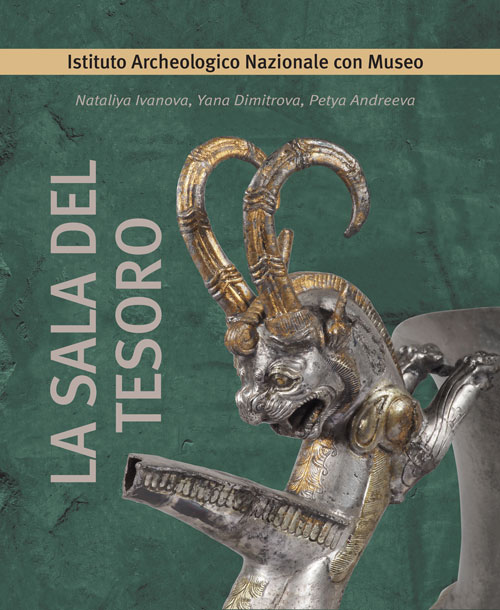
Nataliya Ivanova – Yana Dimitrova – Petya Andreeva, La Sala del Tesoro(National Archaeological Museum. Catalogues. Volume 41) Sofia 2023ISBN 978-619-254-022-7ISSN 2367-8860)84 S./pp., zahlr. Farbabb./num. colour figs., 25 x 21 cm; broschiert/softcover
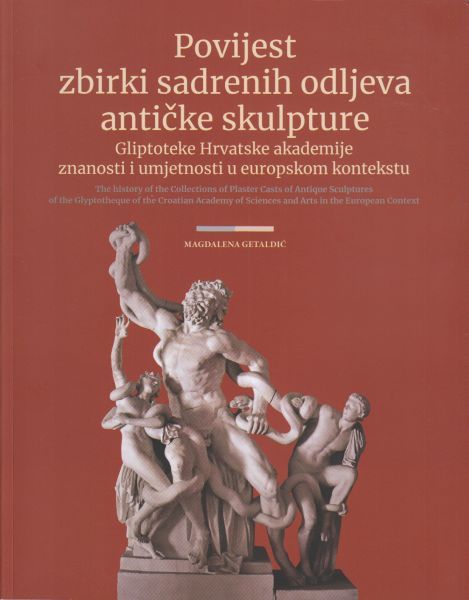
Magdalena Getaldić,Povijest zbirki sadrenih odljeva antičke skulpture Gliptoteke Hrvatske akademije znanosti i umjetnosti u europskom kontekstu / The history of the collections of plaster casts of antique sculptures of the Glyptotheque of the Croatian Academy of Sciences and Arts in the European contextZagreb 2024ISBN 978-953-347-604-9396 S./pp., zahlr. Farb- und S/W-Abb./num. colour and b/w-figs., 27 x 21 cm; broschiert/softcoverzweisprachig kroatisch – englisch / bilingual croatian – englishThis is the first monographic presentation of collections of plaster casts in Croatia, offering a detailed insight into the historical development, importance and role of casts in the history of sculpture – from antiquity to the present day. Through interdisciplinary research and comparative analysis in relation to the most famous European collections, the book examines the significance of plaster casts and their role in understanding ancient sculpture.
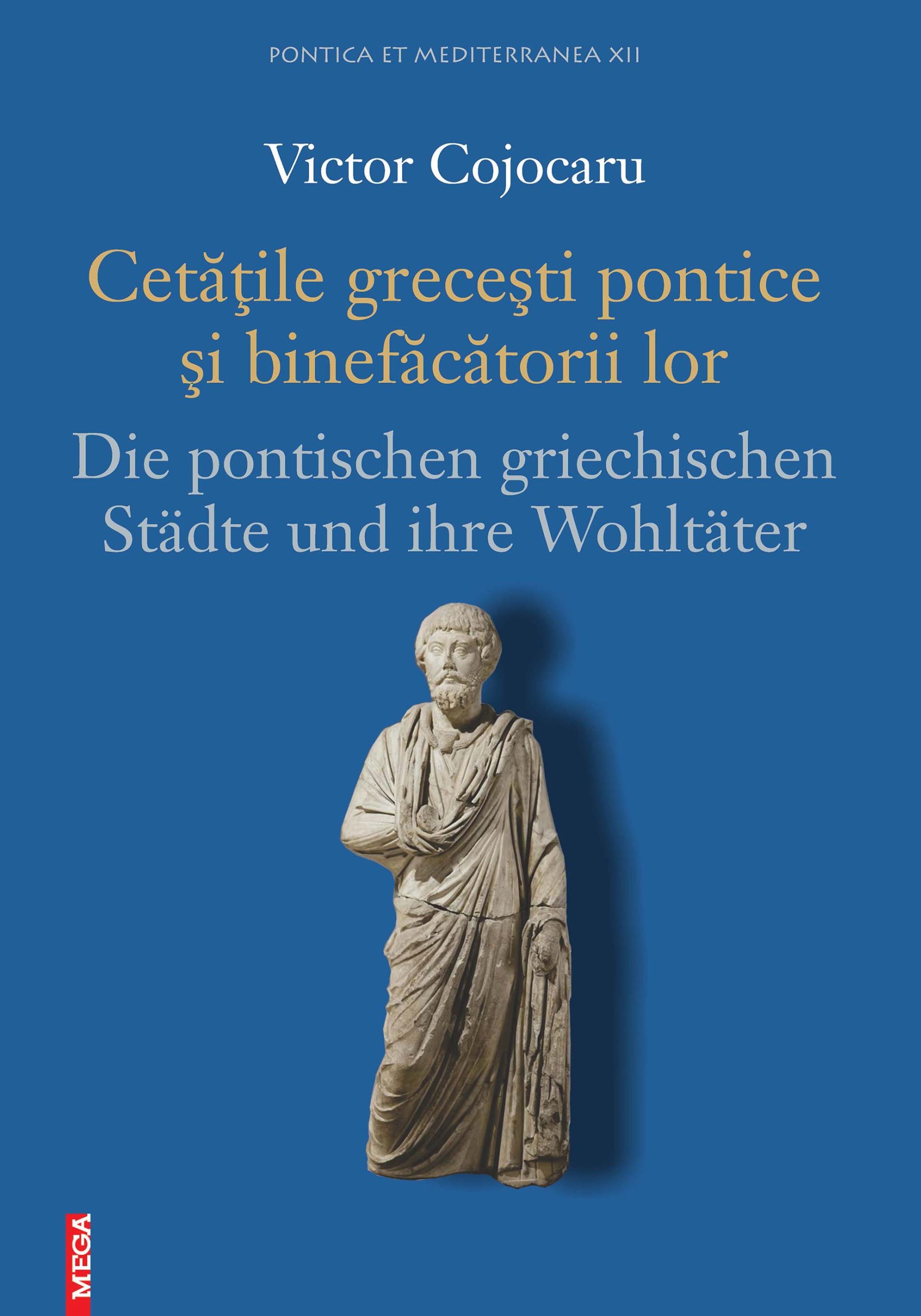
Victor Cojocaru,Cetăţile greceşti pontice şi binefăcătorii lor /Die pontischen griechischen Städte und Ihre Wohltäter(Pontica et Mediterranea, Band XII)Cluj – Napoca 2025ISBN 978-606-020-951-5738 S./pp., zahlr. Farb- und S/W-Abb./num. colour and b/w-figs., 24,5 x 18 cm; kartoniert/hardcoverrumänisch mit ausführlicher deutscher Zusammenfassung /romanian with extended german summaryDas Buch ist eine Weiterführung der Forschungen des Autors zur Institution der Proxenie im Schwarzmeerraum und weitet den Blick auf die Frage nach der Rolle von Wohltätern im Leben pontischer griechischer Städte. Gestützt auf eine umfassende epigraphische Dokumentation und einen konsequent angewendeten vergleichenden Ansatz, wirft der Band ein neues Licht darauf, wie wohltätige Handlungen – und deren öffentliche Ehrung – den sozialen Zusammenhalt und die Stabilität dieser antiken Gemeinschaften förderten. Das Werk richtet sich gleichermaßen an Fachleute wie an ein breiteres Publikum, das sich für die Ursprünge des europäischen Bürgersinns interessiert. Es bietet eine tiefgehende Reflexion über gemeinnütziges Engagement in der Antike und unterstreicht dessen anhaltende Bedeutung für heutige Debatten um gesellschaftliche Verantwortung.

Nenad Cambi, Triptych of Studies. Essays of Ancient Sculptures / Triptih Studija: Eseji o antičkoj skulpturiSplit 2025ISBN 978-953-163-567-7 220 S./pp., 233 Farb- und S/W-Abb./num. colour and b/w-figs., 23,5 x 16,5 cm; broschiert/softcover zweisprachig kroatisch - englischbilingual croatian - english
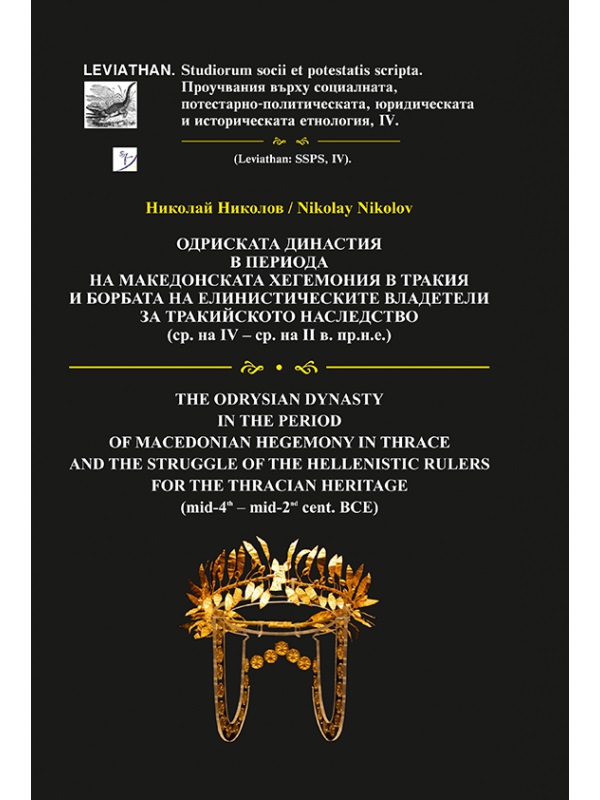
Nikolay Nikolov,The Odrysian Dynasty in the Period of Macedonian Hegemony in Thrace and the Struggle of the Hellenistic Rulers for the Thracian Heritage (mid-4th – mid-2nd cent. BCE) / Одриската династия в периода на македонската хегемония в Тракия и борбата на елинистическите владетели за тракийското наследство(LEVIATHAN. Studiorum socii et potestatis scripta. IV)Sofia 2025ISBN 978-619-7602-82-1448 S./pp., zahlr. S/W-Abb./num. b/w-figs., 28,5 x 20 cm; kartoniert/hardcoverbulgarisch mit englischer Zusammenfassung /bulgarian with english summaryThe object of the study is the Odrysian dynasty, and the subject is the processes that took place in it (including its historical development) in the period from the middle of the 4th to the middle of the 2nd century BCE. The main focus is placed on the state and development of the dynastic house of the Odrysians in the period of the Macedonian hegemony in Thrace and the subsequent era of aspirations toward the Thracian lands by the Hellenistic states – an era that ended with the beginning of the establishment of the military-political presence of the Roman Republic over the territory of the Balkan Peninsula. Table of contents Stefan YORDANOV. THE TERES’ DYNASTY IN DEFENSE OF THE POLITICAL INDEPENDENCE OF ITS DOMAINS. A NEW INVESTIGATION ON THE POLITICAL HISTORY OF ANCIENT THRACE LIST OF ABBREVIATIONS LIST OF ILLUSTRATIONS INTRODUCTION AIM, OBJECTIVES AND FRAMEWORK OF THE RESEARCH METHODOLOGY CHAPTER I. HISTORICAL SOURCES AND HISTORIOGRAPHY I. 1. HISTORICAL SOURCES I. 2. HISTORIOGRAPHY CHAPTER II. THE ODRYSIAN DYNASTY – POTESTARY-POLITICAL TRADITIONS II. 1. A THEORETICAL ANALYSIS OF THE PROCESS OF GENESIS OF THE RULER’S INSTITUTION II. 1. 1. The King-Priest – a Rudimentary Type of “Power” II. 1. 2. The Role of the Sex-Age Stratification in the Genesis of the Ruler’s Institution – Old vs. Young, or Peacetime Chiefs vs. Wartime Chiefs II. 1. 3. Relics of the Traditional System of the Sex-Age Organization in Antiquity and Ancient Thrace II. 2. POWER AND SUCCESSION – THE ODRYSIAN FRATRIARCHAL-PARADYNASTIC SYSTEM OF GOVERNMENT II. 2. 1. Principle of Succession II. 2. 2. Nature of Power and Separatist Tendencies II. 3. A GENERAL PRESENTATION OF THE DEVELOPMENT OF THE “EARLY” ODRYSIAN STATE AS A PARADIGM OF THE FRATRIARCHAL-PARADYNASTIC SYSTEM OF GOVERNMENT II. 3. 1. The Paradynastic Institution II. 3. 2. The Reign of Kotys I and the Uprisings of Adamas/Adamantus and Milthocytes – an Episodes from the Fratriarchal Struggles among the Odrysians II. 3. 3. The Partition of the Odrysian State – a Model of Formation of “Subsidiary” Odrysian State Formations CHAPTER III. THE MACEDONIAN HEGEMONY IN THRACE (356–323 BCE) III. 1. STAGES OF MILITARY-POLITICAL ESTABLISHMENT OF THE MACEDONIAN HEGEMONY OVER THE LANDS OF THE DIVIDED ODRYSIAN STATE (356–341 BCE) III. 1. 1. Territorial Core of the Odrysians and Geographical Dimensions of their Military-Political Influence III. 1. 2. Between Ketriporis and Amatocos – Initial Steps of Philip II in Thrace (356–352 BCE) III. 1. 3. The First Campaign of Philip II against Kersebleptes – Knowing the Enemy (352/351 BCE) III. 1. 4. The Second Campaign of Philip II againt Kersebleptes and the Peace of Philocrates – the Forerunners of the Macedonian Hegemony in Thrace (346 BCE) III. 1. 5. The Third Campaign of Philip II against Kersebleptes (342/341 BCE) – the Submission of Thrace (?) III. 2. CHARACTERISTICS OF THE MACEDONIAN HEGEMONY ACCORDING TO THE WRITTEN SOURCES ON THE CONQUESTS OF PHILIP II AND ALEXANDER III III. 2. 1. Main Patterns in the Policy of Conquest of Philip II – a Paradigm of Synthesis between the Macedonian’s Hegemony Ambitions and the Greeks’s Panhellenistic Dreams III. 2. 2. Main Patterns in the Policy of Conquest of Alexander III – Continuity and Evolution of the Philip’s Legacy III. 3. THE ODRYSIAN DYNASTY AND THE MACEDONIAN HEGEMONY IN THRACE (340–323 BCE) III. 3. 1. Presumed Odrysian Dynastic Centres after 341 BCE III. 3. 2. The Policy of Alexander III towards Thrace CHAPTER IV. THE STRUGGLE FOR THE THRACIAN HERITAGE (323–146 BCE) IV. 1. FROM PARADYNASTY TO DYNASTY – THE “SUBSIDIARY” ODRYSIAN AND POST-ODRYSIAN STATE FORMATIONS FROM THE END OF 4th TO THE END OF 3rd CENTURY BCE IV. 1. 1. Seuthes (III) and the Seuthopolian Dynasty IV. 1. 2. Spartokos, Skostokos (?) and the Dynastic House in Kabyle IV. 1. 3. Dromichaetes – the “Odrysian” Ruler of the Getae IV. 1. 4. Other Odrysian and post-Odrysian Dynastic Branches – Kotys (son of Raizdos), Kotys (father of Rhaskuporis), Sadala IV. 2. THRACE, THE ODRYSIANS AND LYSIMACHUS – THE DECLINE OF THE HEGEMONY OVER THRACE (323–281 BCE) IV. 2. 1. Lysimachus and the End of the Argeads (323–305/304 BCE) IV. 2. 2. Lysimachus the Basileus (305/304–281 BCE) – an Attempt to Establish a New Hegemony in Thrace (?) IV. 3. THE ASPIRATIONS FOR THE LYSIMACHUS’ LEGACY – THE “HELLENISTIC HEGEMONY” IN THRACE (281–221 BCE) IV. 3. 1. The Antigonid Dynasty – New Macedonian Ambitions towards Thrace IV. 3. 2. The Seleucid Dynasty – the Thracian Campaign of Antiochus II Teos IV. 3. 3. The Ptolemaic Dynasty – the Odrysian Diaspora in Egypt IV. 4. ROME AND THE ABOLITION OF THE HELLENISTIC STATUS QUO IN THRACE (221–146 BCE) IV. 4. 1. The Roman Republic and the Hellenistic Monarchies (221–188 BCE) – the Roman Dictates on Philip V and Antiochus III IV. 4. 2. Trends in the Expansion of the Roman Republic from the end of the 3rd and the beginning of the 2nd century BCE IV. 4. 3. Thrace on the Verge of Two Eras (188–146 BCE) – the Odrysian Dynastic Line of Seuthes, Kotys and Teres CONCLUSION APPENDICES I. THE “LATE” ODRYSIAN RULERS: HISTORICAL FIGURES OR HISTORIOGRAPHICAL MYTH II. TEREUS = TERES (?), OR BETWEEN MYTHOLOGY AND HISTORY – DID THE ODRYSIAN LEGENDARY GENEALOGY EXIST? III. RESPONSES TO REVIEWERS’ COMMENTS SUMMARY IN ENGLISH BIBLIOGRAPHY
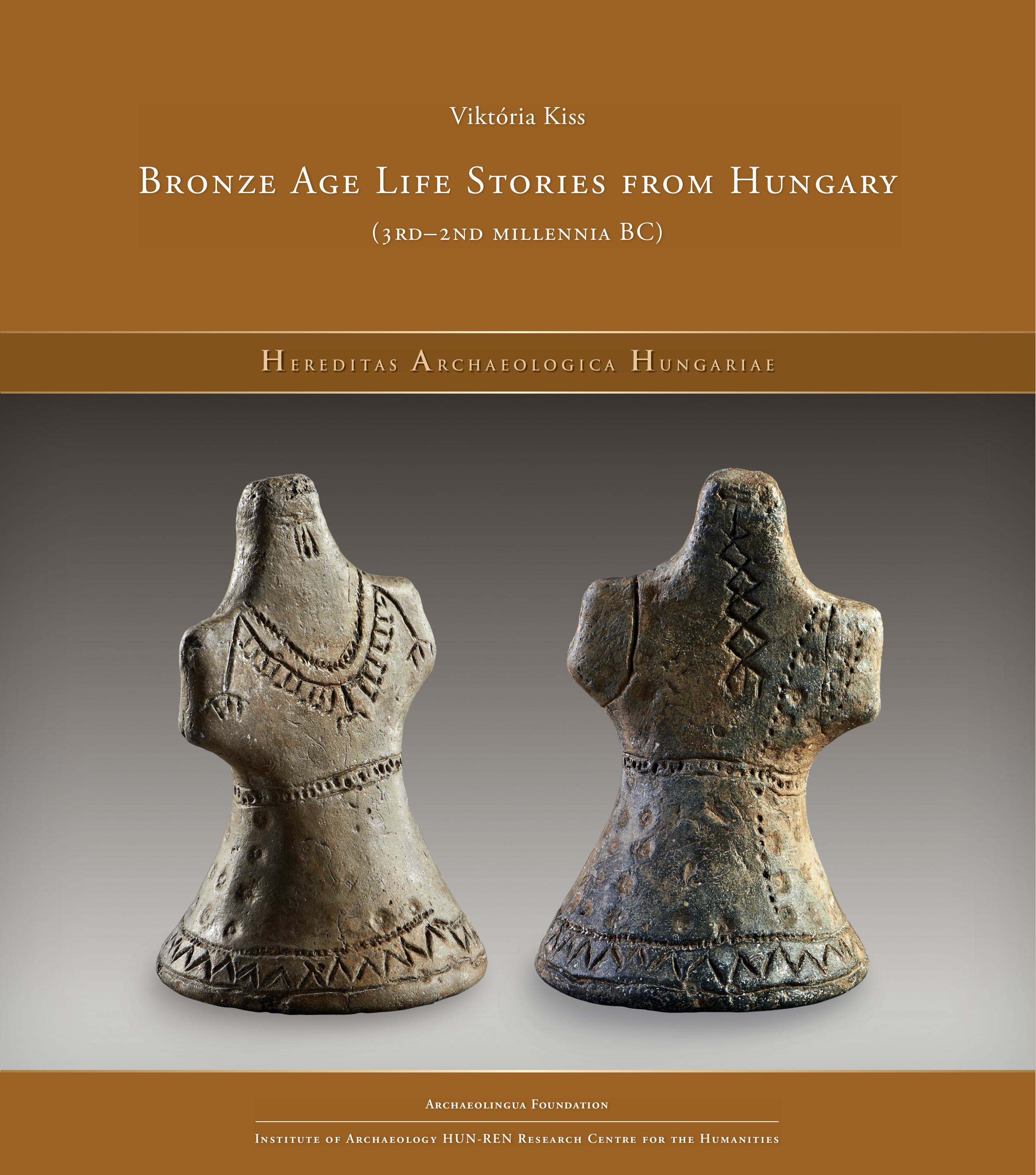
Víktoria Kiss, Bronze Age Life Stories from Hungary (3rd–2nd millennia BC)Budapest 2025ISBN 978-615-5766-79-4208 S./pp., zahlr. Farb- und S/W-Abb. / num. colour and b/w-figs., 24 x 21 cm; broschiert/softcover
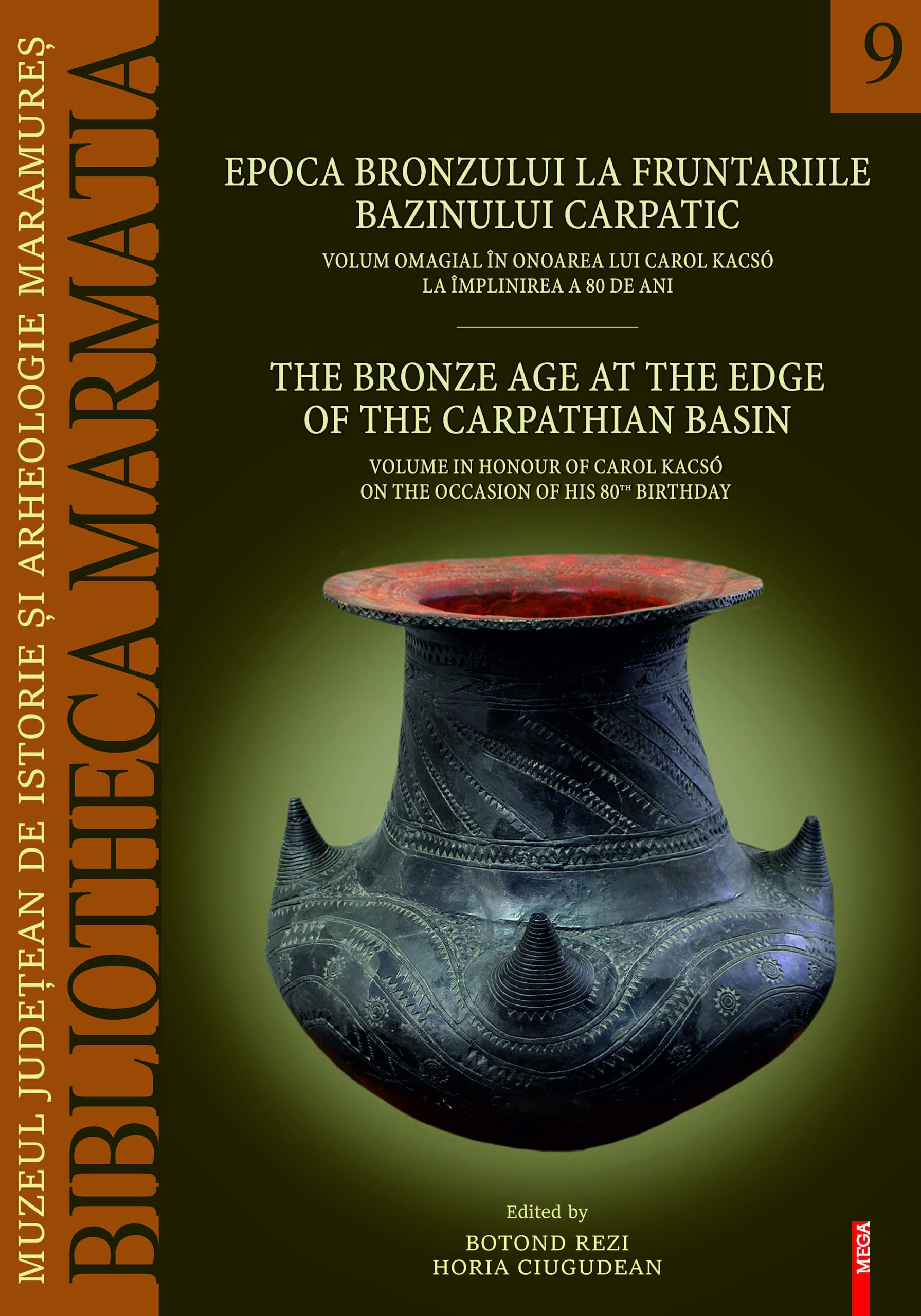
Botond Rezi – Horia Ciugudean (eds.),The Bronze Age at the edge of the Carpathian basin : volume in honour of Carol Kacsó on the occasion of his 80th birthday / Epoca bronzului la fruntariile Bazinului carpatic : volum omagial în onoarea lui Carol Kacsó la împlinirea a 80 de aniCluj – Napoca 2025ISBN 978-606-020-925-6376 S./pp., zahlr. Farb- und S/W-Abb./num. colour and b/w-figs., 29,7 x 21 cm; kartoniert/hardcover
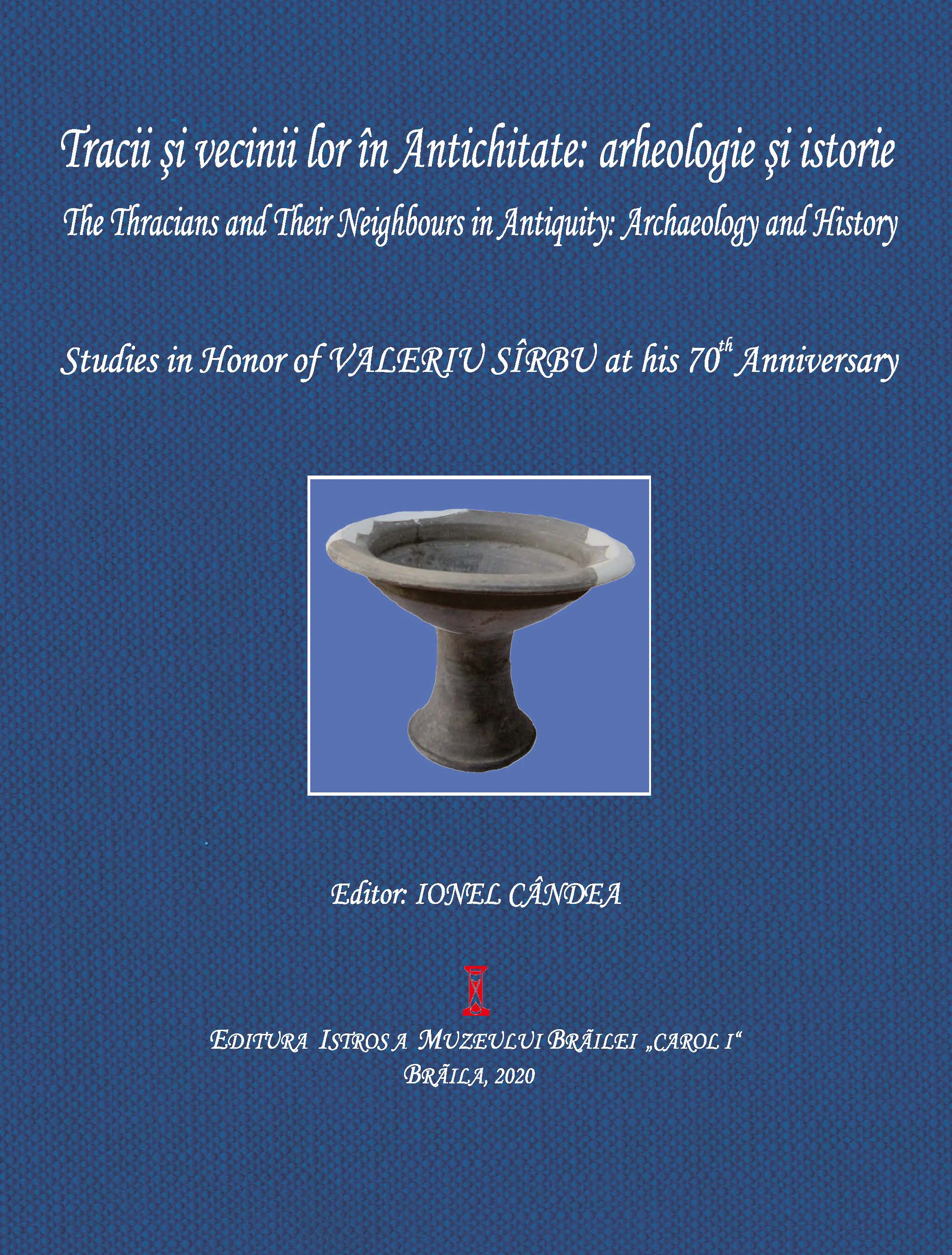
Ionel Cândea (ed.), The Thracians and Their Neighbours in Antiquity: Archaeology and History. Studies in Honor of Valeriu Sîrbu at his 70th AnniversaryBrăila 2020ISBN 978-606-654-403-0XXVIII + 562 S./pp., Farb- und S/W-Abb./colour and b/w-figs., 23 x 17 cm; kartoniert/hardcover

Nikola Tonkov, Integrated magnetic and electrical resistivity survey of archaeological sites / Комплексно магнитно и електросъпротивително проучване на археологически обекти (Excavations and Research / Разкопки и проучвания, vol. 52)Sofia 2024ISBN 978-619-245-479-1176 S./pp., zahlr. Farb- und S/W-Abb./num. colour and b/w-figs., 28,5 x 20 cm; kartoniert/hardcover Table of contents Предговор 1. ВЪВЕДЕНИЕ 2. МАГНИТОПРОУЧВАНЕ 2.1. Принципи 2.2. Видове магнитометри 2.3. Методика 2.3.1. Апаратура 2.3.2. Мрежа на измерване 2.3.3. Обработка на данните 2.3.4. Пречещи фактори (източници на смущения) 3. ЕЛЕКТРОСЪПРОТИВИТЕЛНО ПРОУЧВАНЕ 3.1. Принципи 3.2. Методика 3.2.1. Избор на електродна схема 3.2.2. Апаратура 3.2.3. Мрежа на измерване 3.2.4. Обработка на данните 3.2.5. Пречещите фактори 4. КОМПЛЕКСНО МАГНИТНО И ЕЛЕКТРОСЪПРОТИВИТЕЛНО ПРОУЧВАНЕ НА АРХЕОЛОГИЧЕСКИ ОБЕКТИ 4.1. Античен обект Скобелеве север 4.2. Античен обект Скобелево - Бозаджии 4.3. Античен обект Кермен изток 4.4. Античен обект Кермен север 4.5. Античен обект при с. Коньово 4.6. Античен обект Кермен запад 4.7. Светилище на нимфите и Афродита при с. Каснаково 4.8. Античен обект при с. Алдомировци 4.9. Никополис ад Иструм 4.10. Кабиле и Пистирос 4.11. Обекти от праисторията при с. Чокоба и гр. Върбица 4.12.Тракийска надгробна могила „Гармишка тумба" при гр. Черноморец 5. ЗАКЛЮЧЕНИЕ БИБЛИОГРАФИЯ SUMMARY Bulgarisch mit ausführlicher englischer ZusammenfassungBulgarian with an extended summary in English
